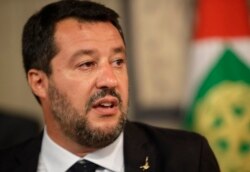Italy has increased relocation of migrants around Europe, official figures showed Wednesday, reducing frictions around the issue and enabling far-right leader Matteo Salvini focus more on the economy.
Interior Ministry data showed that 172 migrants who came onshore from the Mediterranean were sent elsewhere in the last three months, compared with just 90 in the January-August period.
Immigration has been one of Italy's most contentious issues and fueled the rise of Salvini's League party, which ruled in coalition with the 5-Star Movement from mid-2018 until August.
The new administration signed an agreement to distribute migrants saved from the Mediterranean around the European Union to ease pressure on southern states.
Salvini's replacement as interior minister, Luciana Lamorgese, is a technocrat with no party affiliation and has established better relations with European partners.
"European countries prefer the current government and interior minister to Salvini, who constantly accused them," said Gianfranco Pasquino, an analyst from Bologna University.
During his time in office, Salvini sought to block Italy's ports to charity migrant rescue ships. Those noisy standoffs are over, though the new government of the 5-Star and the center-left Democratic Party has not repealed his laws.
With EU countries offering to take 82% of migrants qualified for relocation, pressure on Italy has eased and Salvini has shifted his focus. Now he leads opposition to reform of the European Stability Mechanism (ESM), which he says could jeopardize citizens' savings with restructuring of Italy's debt.
Polls show the League remains Italy's most popular party.
"Salvini jumps on every issue the government has difficulties with. The ESM [reform] is perfect. He will wait for other occasions and will try to exploit them," Pasquino added.
Italy's immigration problems are, however, far from over.
Arrivals may have halved from last year to 10,960 so far in 2019, according to government data. But there are still 95,000 migrants in Italian centers and more than 1,000 people have died trying to cross the Mediterranean this year, the International Organization for Migration says.






